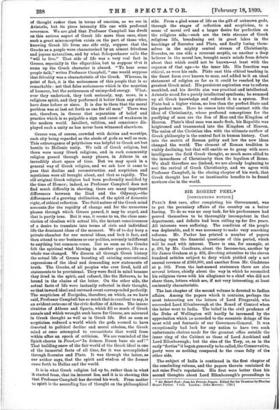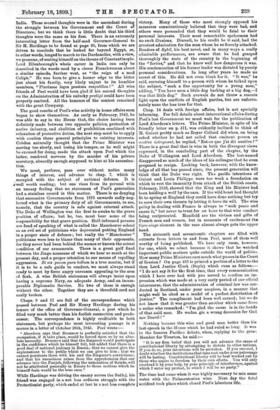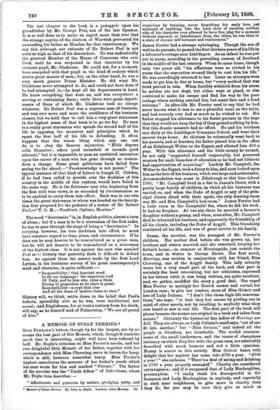SIR ROBERT PEEL.* [CONCLUDING NOTICE.] PEEL'S first care, after completing
his Government, was to put the pecuniary affairs of the country on a better footing. To do so was no easy task, for his predecessors had proved themselves to be thoroughly incompetent in that department, and deficits had been rolling up for five years. All interests were suffering. The condition of the people was deplorable, and it was necessary to make very searching reforms. Mr. Parker has printed a number of papers bearing upon the financial questions of this period, which will be read with interest. There is one, for example, at p. 490, by Mr. Goulburn, about the Income-tax, another by Sir James Graham at p. 493, directing attention to the eleven hundred articles subject to duty which yielded only a net annual revenue of £360,000, and another from Mr. Gladstone at p. 502. From the last-named statesman there are also several letters, chiefly about the way in which he reconciled his religions views with his allegiance to a chief who did not share them, letters which are, if not very interesting, at least eminently characteristic.
The last chapter of the second volume is devoted to Indian affairs. Among the papers which it contains, perhaps the most interesting are the letters of Lord Fitzgerald, who succeeded Lord Ellenborough at the Board of Control when the latter went to India. The belief in the civil prudence of the Duke of Wellington will hardly be increased by the approbation which lie accorded to the eccentric doings of the most wild and fantastic of our Governors-General. It was exceptionally bad luck for any nation to have two such unfortunate choices made for the greatest office outside the inner ring of the Cabinet as those of Lord Auckland and Lord Ellenborough; but the sins of the Tory, or, as in the early "forties" it began generally to be called, the Conservative, party were as nothing compared to the crass folly of the other side.
The subject of India is continued in the first chapter of the concluding volume, and the papers therein contained do not raise Peel's reputation. His first were better than his second thoughts about Lord Ellenborongh's proceedings in
• Sir Robert Peel: from his Private Papers. Edited for his Trustees by Charles Stuart Parker. 3 vole. London: John Murray. [32e.]
India. These second thoughts were in the ascendant during the struggle between his Government and the Court of Directors; but we think there is little doubt that his third thoughts were the same as his first. There is an extremely interesting letter from the half-mad Governor-General to Sir H. Hardinge to be found at page 30, from which we are driven to conclude that he looked far beyond Egypt, or, in other words, longed to march to the Dardanelles, with a view, we presume, of seating himself on the throne of Constantinople. Lord Ellenborongh's whole career in India can only be described in the words used by a clever Frenchwoman about a similar episode, further west, as "the reign of a mad Caliph." He was born to give a keener edge to the bitter jest about his family, very likely unjust to its humbler members, "Plurimae leges pessima respublica ! " All wise friends of Peel would have been glad if his second thoughts on the Administration of his unlucky protege could have been properly omitted. All the honours of the contest remained with the great Company.
The good results of Peel's wise activity in home affairs soon began to show themselves. As early as February, 1843, he was able to say in the House that, the choice having been definitely made between two opposite policies, protection of native industry, and abolition of prohibition combined with relaxation of protective duties, the next step must be to apply with caution those general principles to existing interests. Cobden naturally thought that the Prime Minister was moving too slowly, and losing his temper, as he well might be excused for doing, made the attack upon Peel which the latter, rendered nervous by the murder of his private secretary, absurdly enough supposed to hint at his assassina- tion.
We must, perforce, pass over without notice many things of interest, and advance to chap. 7, which is occupied with the subject of national defence. It is .well worth reading; but one rises from its perusal with an uneasy feeling that no statesman of Peel's generation had a stainless record in this matter. There is no denying that successive Governments from 1815 onwards sadly neg- lected what is the primary duty of all Governments, to see, namely, that the country is safe against external attack.
The Duke of Wellington was the first to awake to the grave position of affairs ; but he, too, must bear some of the responsibility for that grave position. Half-informed persons are fond of speaking of what is called the Manchester school as an evil set of politicians who deprecated putting England in a proper state of defence ; but really the " Manchester " politicians were less to blame than many of their opponents, for they never had been behind the scenes or known the actual condition of our armaments. There is a great gulf fixed between the Jingo nonsense of which we hear so much at the present day, and a proper attention to our means of repelling aggression. Si vis pacem Tara Nihum is a true maxim, but if it is to be a safe guide to conduct, we must always stand ready to meet by force angry unreason appealing to the arm of flesh. A wise British statesman will always insist upon having a supreme Navy, an adequate Army, and an incom- parable Diplomatic Service. No two of these is enough without the other. Together they are a threefold cord not easily broken.
Chaps. 9 and 11 are full of the correspondence which passed between Peel and Sir Henry Hardinge during his tenure of the office of Governor-General, a post which he filled very much better than his foolish connection and prede- cessor. The correspondence is highly creditable to both statesmen, but perhaps the most interesting passage in it occurs in a letter of October 26th, 1845. Peel wrote :-
"Aberdeen says that Brunnow is perfectly satisfied that the occupation, if it take place, would be forced upon us by an abso- lute necessity. Brunnow said that the Emperor would participate in the confidence which he himself felt, but added that there is a good deal of national jealousy in Russia; that we cannot give the explanations to the public which we can give to him ; that we cannot penetrate them with his and the Emperor's convictions ; and that his uneasiness arises from the apprehension that our advance into the Punjab, following the annexation of Scinde, will not be attributed generally in Russia to those motives which he himself feels would be the true ones."
While Hardinge was driving the enemy across the Sntlej, his friend was engaged in a not less arduous struggle with the Protectionist party, which ended at last in a not less complete
victory. Many of those who most strongly opposed hie measures conscientiously believed that they were bad, and others were persuaded that they would be fatal to their
personal interests. Their most remarkable spokesman had no such illusions. Disraeli, to his credit be it said, had the greatest admiration for the man whom he so fiercely attacked. Readers of Sybil, his best novel, and in many ways a really admirable performance, are aware that he had grasped thoroughly the state of the country in the beginning of the " forties," and that be knew well how dangerous it was. His condemnation of his former leader was dictated by purely personal considerations. In long after years he made no secret of this. He did not even blush for it. " It was," he
said, excusing himself to a person with whom he talked upon the subject, "such a fine opportunity for a young man,"
adding, " You have seen a little dog barking at a big dog,—I was that little dog." Such avowals do not throw a roseate light upon the conflicts of English parties, but are unfortu- nately none the less true for that.
Chap. 14 deals with foreign affairs, but is not specially informing. For full details about international affairs during Peel's last Government we must wait for the publication of Lord Aberdeen's letters. The Prime Minister, in spite of his friendly letter on p. 411, was evidently inclined to think of M. Guizot pretty much as Royer Collard did when, on being asked whether he had not called that eminent person an austere intriguant, he replied, "Est-ce que j'ai dit austere ? " There is a great deal that is wise in both the divergent views expressed, in the concluding part of the chapter, by the Duke of Wellington and Lord Aberdeen. The last-named disapproved so much of the ideas of his colleague that he even proposed to resign. Looking back, however, with the know- ledge of all that has passed since, the present generation will think that the Duke was right. The pacific intentions of Guizot and Louis Philippe were too weak a foundation on which to rest the immunity from attack of the British coasts.
February, 1848, showed that the King and his Minister had been holding a wolf by the ears. If the wild beast had thought fit to spring at England they could have done nothing but try to save their own throats by letting it have its will. The wise policy in dealing with France is always to " seek peace and ensue it," but never to trust for an hour to that wise conduct being reciprocated. Manifold are the virtues and gifts of French men and women, but in moments of excitement the -tigre-singe element in the race almost always gets the upper
hand.
The sixteenth and seventeenth chapters are filled with extracts from letters to and from Peel, most of them well worthy of being published. We have only room, however, for one, which we select because it shows that he watched important public matters quite outside the world of politics.
How many Prime Ministers care much what passes in the Court of Session ? On page 483 is printed a portion of a letter to the
then Lord Justice Clerk (Boyle) which runs as follows :— " I do not say it for the first time, that every communication which I have ever had with you served to confirm an im- pression which was made at a very early period of our official intercourse, that the administration of criminal law was con- ducted in Scotland, under your auspices, in a manner that might well be cited as a model of a perfect distribution of
justice." The compliment had been well earned; but we do not know that it was greater than another which came from a suitor who remarked : "I'm glad the cause is in the hands of that auld man. He wadna gie a wrang deceesion for Gol nor Deevil !"
Nothing became this wise and good man better than his last speech in the House which he had ruled so long. It was in the famous Pacifico debate, when, replying to the grew., Member for Tiverton, he said :- " It is my firm belief that you will not advance the cause of constitutional liberty by attempting to dictate to other nations. If you do so, your intentions will be mistaken. If you succeed, I doubt whether the institutions that take root under your patronage will be lasting. Constitutional liberty will be best worked out by those who aspire to freedom by their own efforts. You will only overload it by your help, by your principle of interference, against which I enter my protest, to which I will be no party."
The time had come when it was highly necessary to mix some water with the Palmerstonian wine. Next day the fatal accident took place which closed Peel's laborious life. The last chapter in the book is a panegyric upon his grandfather by Mr. George Peel, son of the late Speaker. It is so well done as to make us regret more than ever that the strange caprice of the electors of Warwick prevented his succeeding his father as Member for that constituency. We
say this although our estimate of Sir Robert Peel is not quite so high as that of his descendant. He was undoubtedly
the greatest Member of the House of Commons who ever lived, until he was surpassed in that character by his eminent pupil, Mr. Gladstone. He could not, for a moment, have competed with that pupil in the kind of oratory which moves great masses of men ; but, on the other hand, he was a very much greater Prime Minister. He did what Mr. Gladstone never attempted to do, and could not have done if he had attempted it,—he kept all his departments in hand. He knew everything that went on, and was everywhere a moving or restraining force ; while there were great depart- ments of State of which Mr. Gladstone took no charge whatever. Sir Robert Peel was a supreme man of business, and won ever more and more the confidence of the business classes, but we hold that to call him a very great statesman in the highest sense of that term is to go too far. No man is a really great statesman who spends the second half of his life in opposing the measures and principles which he spent the first half of his life in defending. It often happens that the wisest thing which any one can do is to obey the famous injunction, " Mitis depone
colla Sicamber ; adora quod incendisti et incende quod adorasti," but it is impossible to pass an unstinted encomium upon the career of a man who has gone through so tremen- dous a change. Some great politicians have failed from seeing too far ahead,—" Foreknowledge is not power." The typical instance of that kind of failure is Joseph II. Cobden, if he had been called to preside over the destinies of this country in the middle of this century, would have failed in the same way. He is the fortunate man who, beginning from the first with wise views, is so seconded by circumstances as to be enabled to carry them into effect. Such was in our own times the great statesman to whom was handed on the inscrip- tion first proposed for the pedestal of a statue of Sir Robert Peel,—" T. 0. M.,—Traditori, Optimo, Maximo."
The word "doctrinaire "is, in English politics, almost a term of abuse ; but if a man is to be a statesman of the first order, he has to pass through the stage of being a " doctrinaire." In carrying, however, his true doctrines into effect, he must have constant regard to time, place, and circumstance. If he does not he may deserve to be remembered as a great man, but he will not deserve to be remembered as a statesman of the highest class. It is not against the men who assailed Peel mrst, bitterly that posterity finds it difficult to defend him. As against them the answer made by the first Lord Lytton, in his luminous survey of his great contemporary's work and character, is quite sufficient :— " Responsibility ! that heaviest word In all our language ! the imperious lord Of Duty, and to him who rules a State Strong in proportion as its slave is great. Responsibility—accept that clue
And all the maze of motive clears to view."
History will, we think, settle down to the belief that Peel's defects, splendidly able as he was, were intellectual, not moral; and Englishmen, for at least a century from his death, will say, as he himself said of Palmerston, " We are all proud of him."








































 Previous page
Previous page